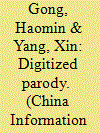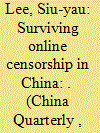| Srl | Item |
| 1 |
ID:
095326


|
|
|
|
|
| Publication |
2010.
|
| Summary/Abstract |
This article investigates egao-technology-enabled online parody in contemporary China. Egao is a site where issues of power struggle, class reconsolidation, social stratification, (online) community formation, and cultural intervention, along with the transformative power of digital technologies, intersect. Through an analysis of Hu Ge's "The Bloody Case of a Steamed Bun," we argue that egao provides an alternative locus of power, permitting the transgression of existing social and cultural hierarchies. Satiric and ludicrous in nature, egao playfully subverts a range of authoritative discourses and provides a vehicle for both comic criticism and emotional catharsis. As an individualized form of expression of the new digital generation, it also offers insight into the collective attitudes of the new class of netizens.
|
|
|
|
|
|
|
|
|
|
|
|
|
|
|
|
| 2 |
ID:
149752


|
|
|
|
|
| Summary/Abstract |
What accounts for online satirical campaigns that survive censorship in China where the state has formidable power to censor and manipulate online communication? Through comparative case studies of three attempts to challenge the policies or malpractices of the Chinese state in 2009, this article explains how different satirical tactics can influence the outcomes of online activism. It argues that online satirical campaigns are most likely to survive when activists adopt the tactic of “parodic satire,” whereby activists mimic a specific practice of the state and skilfully transplant it to other contexts. Since the language used by the activists resembles that of the powerful, the tactic allows netizens to exaggerate the internal contradictions of the policies or practices concerned without creating an easily identifiable symbol of resistance in the process. This tactic not only increases the cost to the state of censoring critical messages, but also restrains activists from extending their criticisms of the original subject to other areas. As a result, it increases the chance for the activists to exert insistent pressure on the state.
|
|
|
|
|
|
|
|
|
|
|
|
|
|
|
|